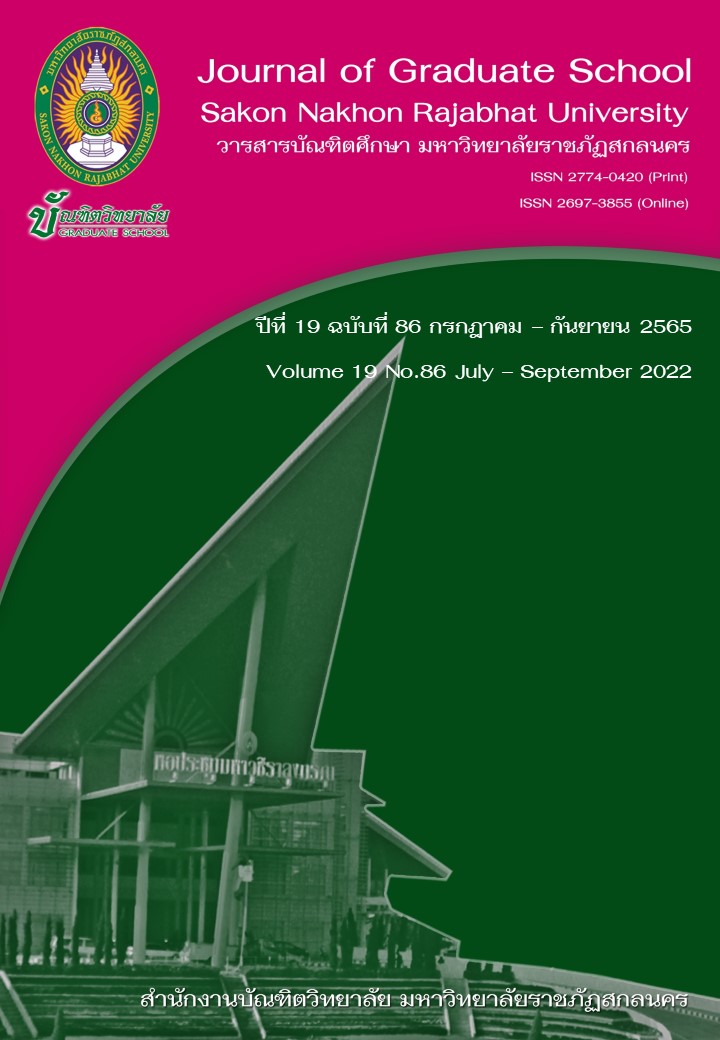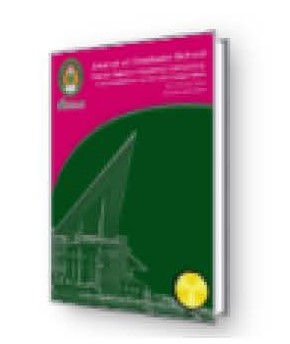แนวทางการพัฒนาภาวะผู้นำเชิงจริยธรรมของผู้บริหารโรงเรียนเอกชนในจังหวัดเลย
คำสำคัญ:
แนวทางการพัฒนา, ภาวะผู้นำเชิงจริยธรรม, โรงเรียนเอกชนบทคัดย่อ
การวิจัยครั้งนี้ มีวัตถุประสงค์เพื่อ 1) เพื่อศึกษาสภาพปัจจุบัน สภาพที่พึงประสงค์ และความต้องการจำเป็นในการพัฒนาภาวะผู้นำเชิงจริยธรรมของผู้บริหารโรงเรียนเอกชน ในจังหวัดเลย 2) เพื่อกำหนดแนวทางการพัฒนาภาวะผู้นำเชิงจริยธรรมของผู้บริหารโรงเรียนเอกชน ในจังหวัดเลย และ 3)เพื่อประเมินแนวทางการพัฒนาภาวะผู้นำเชิงจริยธรรมของผู้บริหารโรงเรียนเอกชน ในจังหวัดเลย ที่พัฒนาขึ้น โดยใช้การวิจัยแบบผสมผสาน (Mixed Methodology) ระหว่างการวิจัยเชิงปริมาณและเชิงคุณภาพ มีขั้นตอนการวิจัย 3 ระยะ คือ ระยะที่ 1 การศึกษาสภาพปัจจุบัน สภาพที่พึงประสงค์ และความต้องการจำเป็น ในการพัฒนาภาวะผู้นำเชิงจริยธรรมของผู้บริหารโรงเรียนเอกชน ในจังหวัดเลย ระยะที่ 2 การกำหนดแนวทางการพัฒนาภาวะผู้นำเชิงจริยธรรมของผู้บริหารโรงเรียนเอกชน ในจังหวัดเลย และระยะที่ 3 การประเมินแนวทางการพัฒนาภาวะผู้นำเชิงจริยธรรมของผู้บริหารโรงเรียนเอกชน ในจังหวัดเลย กลุ่มตัวอย่างที่ใช้ในการวิจัยเชิงสำรวจ ประกอบด้วย ผู้บริหารโรงเรียน และ ครูโรงเรียนเอกชน ในจังหวัดเลย จำนวน 274 คน กลุ่มเป้าหมายในการศึกษาพหุกรณี จำนวน 3 โรงเรียน กลุ่มเป้าหมายเป็นผู้ทรงคุณวุฒิ ร่วมการสนทนากลุ่ม (Focus Group Discussion) จำนวน 13 คน ผู้เชี่ยวชาญประเมินอิงเกณฑ์ จำนวน 5 คน เครื่องมือที่ใช้ในการวิจัย คือ แบบสอบถาม แบบสัมภาษณ์กึ่งโครงสร้าง การวิเคราะห์ข้อมูล ได้แก่ ความถี่ ค่าเฉลี่ย ส่วนเบี่ยงเบนมาตรฐาน และวิเคราะห์เนื้อหาโดยวิธีพรรณนาวิเคราะห์ ผลการวิจัย พบว่า 1. ผลการศึกษาสภาพปัจจุบัน สภาพที่พึงประสงค์ ในการพัฒนาภาวะผู้นำเชิงจริยธรรมของผู้บริหารโรงเรียนเอกชนในจังหวัดเลย พบว่า สภาพปัจจุบันการพัฒนาภาวะผู้นำเชิงจริยธรรมของผู้บริหารโรงเรียนเอกชน ในจังหวัดเลย โดยภาพรวมอยู่ในระดับมาก (= 4.20, S.D. = 0.97) และสภาพที่พึงประสงค์ โดยภาพรวมอยู่ในระดับมากที่สุด (
= 4.41, S.D. = 0.62) 2. ผลการศึกษาความต้องการจำเป็น (PNI) ของแนวทางการพัฒนาภาวะผู้นำเชิงจริยธรรมของผู้บริหารโรงเรียนเอกชน ในจังหวัดเลย มีค่า PNImodified อยู่ระหว่าง 0.06 - 0.13 โดยภาพรวมและรายด้าน (PNImodified = 0.09) และการจัดเรียงลำดับความสำคัญของความจำเป็นในรายด้าน พบว่า ด้านที่มีค่า PNI modified สูงสุด คือ ด้านการยึดหลักคุณธรรมความดี (PNImodified = 0.13) รองลงมา คือ ด้านความเป็นแบบอย่างที่ดี (PNImodified = 0.12) ด้านวิสัยทัศน์ (PNImodified = 0.09) ด้านความรับผิดชอบ (PNImodified = 0.08) และด้านความซื่อสัตย์สุจริต (PNImodified = 0.06) ตามลำดับ 3. แนวทางการพัฒนาภาวะผู้นำเชิงจริยธรรมของผู้บริหารโรงเรียนเอกชน ในจังหวัดเลย ได้องค์ประกอบ 5 ด้าน ประกอบด้วย 3.1 ด้านวิสัยทัศน์ ประกอบด้วยแนวทางการพัฒนา 2 แนวทาง ดังนี้ 1) ผู้บริหารมีวิสัยทัศน์ในการบริหารงานที่ทันต่อการเปลี่ยนแปลงในยุคปัจจุบัน และ 2) ผู้บริหารมีภาวะผู้นำเชิงจริยธรรมในการพัฒนาองค์กรให้มีประสิทธิภาพ 3.2 ด้านความซื่อสัตย์สุจริต ประกอบด้วยแนวทางการพัฒนา 3 แนวทาง ดังนี้ 1) ผู้บริหารบริหารงานด้วยความซื่อสัตย์สุจริต 2) ผู้บริหารยึดมั่นในคุณธรรมจริยธรรม เปิดใจกว้างรับฟังความคิดเห็นของผู้อื่นและรักษาผลประโยชน์ของสถานศึกษา และ 3) ผู้บริหารเสียสละ และอุทิศตนในการพัฒนาสถานศึกษาด้วยความเต็มใจ 3.3 ด้านความรับผิดชอบ ประกอบด้วยแนวทางการพัฒนา 3 แนวทาง ดังนี้ 1) ผู้บริหารมีความรู้ ความสามารถและความรับผิดชอบต่อองค์กร 2) ผู้บริหารกระจายอำนาจการตัดสินใจให้กับครูและบุคลากร ตามภาระงานที่รับผิดชอบ และ 3) ผู้บริหารสร้างบรรยากาศที่ดีในการทำงาน 3.4 การยึดหลักคุณธรรมความดี ประกอบด้วยแนวทางการพัฒนา 3 แนวทาง ดังนี้ 1) ผู้บริหารปฏิบัติตนเป็นแบบอย่างที่ดีในการปฏิบัติงานในสถานศึกษา 2) ผู้บริหารพัฒนาตนเองตามหลักธรรมของพุทธศาสนามุ่งประโยชน์ส่วนรวมมากกว่าประโยชน์ส่วนตน และ 3) ผู้บริหารมีมนุษยสัมพันธ์ที่ดีต่อครูและบุคลากรในสถานศึกษาและบุคลทั่วไป 3.5 ด้านความเป็นแบบอย่างที่ดี ประกอบด้วยแนวทางการพัฒนา 3 แนวทาง ดังนี้ 1) ผู้บริหารปฏิบัติตนเป็นแบบอย่างในการครองตน ครองคน และครองงาน 2) ผู้บริหารรักษาระเบียบวินัยตามจรรยาบรรณวิชาชีพอย่างสม่ำเสมอ และ 3) ผู้บริหารส่งเสริมภาพลักษณ์ของสถานศึกษา 4. ผลการประเมินโดยอิงเกณฑ์ผู้เชี่ยวชาญของแนวทางการพัฒนาภาวะผู้นำเชิงจริยธรรมของผู้บริหารโรงเรียนเอกชน ในจังหวัดเลย โดยภาพรวม อยู่ในระดับมากที่สุด (
= 4.89, S.D.= 0.19) เมื่อพิจารณารายด้านเรียงลำดับค่าเฉลี่ยมากไปน้อย คือ 1) ด้านความเหมาะสม (
= 4.89, S.D.= 0.19) 2) รองลงมาคือด้านความเป็นไปได้ (
= 4.83, S.D.= 0.39) 3) และด้านความเป็นประโยชน์ (
= 4.91, S.D.= 0.21) ส่วนด้านความถูกต้อง (
= 4.91, S.D.= 0.21) มีค่าเฉลี่ยน้อยที่สุด
เอกสารอ้างอิง
กนกอร สมปราชญ์. (2554). ตัวบ่งชี้ภาวะผู้นำเชิงจริยธรรมสำหรับผู้บริหารสถานศึกษาขั้นพื้นฐาน. รายงานวิจัยฉบับสมบูรณ์ ขอนแก่น: สาขาวิชาการบริหารการศึกษา คณะศึกษาศาสตร์ มหาวิทยาลัยขอนแก่น.
กมลทิพย์ ทองกำแหง. (2554). การศึกษากลยุทธ์การพัฒนาภาวะผู้นำเชิงจริยธรรมสำหรับผู้บริหารโรงเรียนเอกชน. วิทยานิพนธ์ ค.ด. กรุงเทพฯ: จุฬาลงกรณ์มหาวิทยาลัย.
นงลักษณ์ วิรัชชัย และ รุ่งนภา ตั้งจิตรเจริญกุล. (2551) การสำรวจและสังเคราะห์ตัวบ่งชี้คุณธรรม จริยธรรม. กรุงเทพฯ: ศูนย์คุณธรรม.
บุญชม ศรีสะอาด. (2554). การวิจัยเบื้องต้น. (พิมพ์ครั้งที่ 9). กรุงเทพฯ: สุวีริยาสาส์น.
พระมหาวุฒิชัย วชิรเมธี (ว.วชิรเมธี). (2552). ภาวะผู้นำ: จากเนลสัน มันเดล่า โอบามาแห่งทำเนียบขาว. กรุงเทพฯ: สถาบันวิมุตตยาลัย.
ภานุพงศ์ ธนูสาร. (2555). การศึกษาภาวะผู้นำเชิงคุณธรรม จริยธรรมของผู้บริหารสถานศึกษาตามทัศนะครูผู้สอน สังกัดสำนักงานเขตพื้นที่การศึกษามัธยมศึกษา เขต 38 สุโขทัย-ตาก. วิทยานิพนธ์ กศ.ม. พิษณุโลก: มหาวิทยาลัยนเรศวร.
สำนักงานคณะกรรมการพัฒนาการเศรษฐกิจและสังคมแห่งชาติ. (2560). แผนพัฒนาเศรษฐกิจและสังคมแห่งชาติ ฉบับที่ 12 พ.ศ. 2560-2564. กรุงเทพฯ: สำนักนายกรัฐมนตรี.
สลิลทิพย์ ชูชาติ. (2556). พฤติกรรมเชิงจริยธรรมของผู้บริหารสถานศึกษา สังกัดสำนักงานเขตพื้นที่การศึกษาประถมศึกษากำแพงเพชร เขต 2. วิทยานิพนธ์ ค.ม. กรุงเทพฯ: มหาวิทยาลัยมหาจุฬาลงกรณ์ราชวิทยาลัย.
สำนักงานคณะกรรมการส่งเสริมการศึกษาเอกชน. (2550). พระราชบัญญัติโรงเรียนเอกชน พ.ศ. 2550. กรุงเทพฯ: โรงพิมพ์ สกสค.
สุเทพ พงศ์ศรีวัฒน์. (2550). ภาวะผู้นำเชิงจริยธรรม. วารสารดำรงราชานุภาพ, 7(23), 57-60.
สิทธิศักดิ์ ขุนนาแก้ว. (2550). การศึกษาพฤติกรรมด้านจริยธรรมของผู้บริหารโรงเรียน สำนักงาน เขตพื้นที่การศึกษาชลบุรี เขต 1. วิทยานิพนธ์ กศ.ม. ชลบุรี: มหาวิทยาลัยบูรพา.
Krejcie, R. V., & Morgan, D. W. (1970). Determining sample size for research activities. Educational and Psychological Measurement, 30(3), 607-610.
Likert, R. (1967). The Human Organization. New York: McGraw-Hill.
Smith, H.B. (1974). Description of Effective and Ineffective Behavior of school Principals. Dissertation Abstracts International, 48(3), 1935–A.
ดาวน์โหลด
เผยแพร่แล้ว
รูปแบบการอ้างอิง
ฉบับ
ประเภทบทความ
สัญญาอนุญาต
ลิขสิทธิ์ (c) 2022 วารสารบัณฑิตศึกษา มหาวิทยาลัยราชภัฏสกลนคร

อนุญาตภายใต้เงื่อนไข Creative Commons Attribution-NonCommercial-NoDerivatives 4.0 International License.
บทความทุกบทความที่ตีพิมพ์ในวารสารบัณฑิตศึกษา มหาวิทยาลัยราชภัฏสกลนคร ถือว่าเป็นลิขสิทธิ์ของบัณฑิตวิทยาลัย มหาวิทยาลัยราชภัฏสกลนคร






